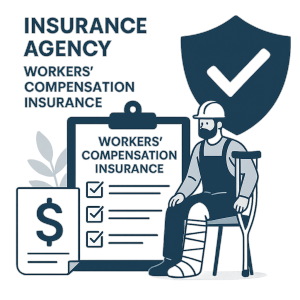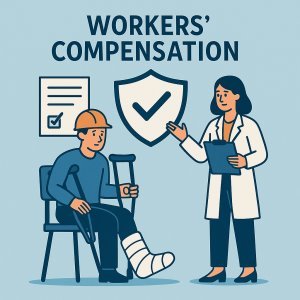
Cheap Workers’ Comp? Employee Leasing Firm Guide
July 23, 2025
Instant Workers’ Comp Quotes—Manpower Agency
July 23, 2025In the dynamic world of staffing firms, where the heartbeat of business relies on connecting talent with chance, ensuring the well-being of workers is paramount. For staffing agencies in Georgia, navigating the complexities of workers’ compensation insurance can be both a critical safeguard and a regulatory maze. This guide unpacks the essentials of workers’ comp insurance tailored specifically for Georgia staffing firms, illuminating how to protect your workforce, manage risks, and stay compliant. Whether you’re a staffing professional new to the Peach State or a seasoned agency seeking clarity, this article offers a clear path through the intricacies of workers’ comp insurance in Georgia’s unique staffing landscape.
Table of Contents
- Understanding Workers’ Compensation Requirements for Staffing Firms in Georgia
- Navigating Coverage Options: Tailoring Workers’ Comp to Temporary and Contract employees
- best Practices for Managing Claims and Reducing Risks in staffing Operations
- Essential Tips for Choosing the Right Workers’ Comp Insurance Provider in Georgia
- Q&A
- Concluding Remarks
Understanding Workers’ Compensation Requirements for Staffing Firms in Georgia

Staffing firms in georgia face unique challenges when it comes to securing workers’ compensation insurance. Unlike conventional employers, these firms must cover a diverse workforce that often includes temporary, contract, and seasonal employees placed across multiple client sites. This complexity requires a clear understanding of state regulations governing workers’ comp,including how coverage applies depending on the nature of employment and placement agreements. In Georgia, most employers with three or more employees are mandated to carry workers’ compensation insurance, but staffing firms must also navigate additional responsibilities to ensure both their direct hires and contracted workers are adequately protected.
Key considerations for staffing companies include:
- Classification of Workers: Determining whether the workers are employees or independent contractors can impact coverage requirements.
- Coverage Across Client Locations: Workers’ comp policies must be tailored to the different work environments and risks associated with each client site.
- Claims Management: Coordinating claims between staffing firms, host employers, and insurers to ensure timely processing and compliance.
| Aspect | Staffing Firm Duty | Common Challenges |
|---|---|---|
| Employee Classification | Verify employment status for proper coverage | Misclassification risks and disputes |
| Policy Coverage | Obtain comprehensive, flexible insurance plans | Determining coverage across multiple sites |
| Claims Coordination | Manage injury claims efficiently | Complexity in coordinating between multiple parties |
Navigating Coverage Options: Tailoring Workers’ Comp to Temporary and Contract Employees

Employers in the staffing industry often face the challenge of providing adequate workers’ compensation coverage that fits the unique nature of temporary and contract employees. Because these workers may transition between assignments or work under multiple clients, a one-size-fits-all policy rarely works. Instead, consider customized coverage options that allow for versatility in premiums and claim handling. Such as, some insurers offer pay-as-you-go policies, which adjust premiums based on actual payroll, making it easier to manage fluctuating workforce sizes without overpaying. Additionally, understanding the classification codes specific to temporary staffing can help ensure that your rates are accurate and reflective of the risks involved.
Another key aspect is clearly defining the responsibility hierarchy between your firm and the host company where the temporary employee works. this clarity affects not only coverage but also claim reporting and liability. Below is a simple matrix outlining typical coverage responsibilities to guide your discussions with insurers and clients:
| Party Involved | Coverage Responsibility | Notes |
|---|---|---|
| Staffing Firm | Primary coverage for employee during assignment | Ensures continuous protection nonetheless of client changes |
| Host Company | May provide secondary or supplementary coverage | Depends on contractual agreements and state laws |
| Employee | Receives benefits from staffing firm’s policy | Claims typically filed through staffing firm’s insurer |
By tailoring your workers’ comp approach to these nuances, you not only protect your temporary workforce better but also strengthen your staffing firm’s reputation as a responsible and reliable partner.
Best Practices for Managing Claims and Reducing Risks in staffing Operations

Implementing a structured approach to claims management not only accelerates the resolution process but also minimizes the financial impact on your staffing firm. Ensure timely reporting of incidents by training your team and temporary workers on the precise steps to follow when injuries occur. Prompt documentation facilitates clear dialog with insurers and medical providers, fostering trust and clarity. Additionally, leveraging technology such as claims management software can streamline tracking, automate alerts for critical deadlines, and maintain organized records, all of which contribute toward a more efficient claims lifecycle.
Risk reduction starts before the first placement. Prioritize comprehensive safety training tailored to the environments where your temporary workers will operate, emphasizing proper equipment use, ergonomics, and hazard awareness. Establish clear safety protocols and partner with clients to verify their on-site conditions meet compliance standards. Developing a proactive culture of safety within the institution can be supported by regular audits, feedback loops, and incentive programs that reward safe behavior.
- Conduct pre-assignment risk assessments
- Implement ongoing safety refreshers
- Maintain clear communication channels between staffing firm, clients, and workers
- Monitor injury trends and adjust preventive measures accordingly
| Risk Management Step | Key Benefit |
|---|---|
| Timely Injury Reporting | Speeds up claim processing |
| Pre-Placement Safety Training | Reduces incidence of workplace injuries |
| Regular Safety Audits | Identifies and remedies hazards proactively |
| Effective Communication | Enhances collaboration and compliance |
Essential Tips for Choosing the Right Workers’ Comp Insurance Provider in Georgia

When selecting a workers’ comp insurance provider in Georgia, understanding the nuances of coverage is vital. Opt for insurers who specialize in staffing firms and possess a deep knowledge of the local legal landscape. This ensures your policy not only complies with state regulations but also adapts to the unique risks associated with temporary and contract employees. Evaluate also their claims process-a seamless and responsive claims experience can save significant time and reduce stress during worker injury incidents.
Look beyond the premiums and examine value-added services such as risk management consultation, workplace safety programs, and 24/7 customer support. Use the following checklist as a guide:
- Experience in Georgia Staffing Industry – Verify their track record with similar firms.
- Financial Stability - Choose carriers with high ratings to ensure claim solvency.
- Customized Policy Options – Flexibility to tailor coverage to your workforce nuances.
- Claim Support Efficiency – Fast processing and dedicated claims adjusters.
- Risk Mitigation Resources – Training and consultation to minimize workplace injuries.
| Provider Attribute | Why It Matters |
|---|---|
| Local Expertise | Ensures compliance with Georgia’s laws |
| Claims Responsiveness | Faster resolution minimizes operational disruption |
| Risk Management Support | Helps prevent injuries before they occur |
Q&A
Q&A: Georgia Staffing Firm Workers’ Comp Insurance Guide
Q1: What is workers’ compensation insurance, and why is it significant for staffing firms in Georgia?
A: Workers’ compensation insurance is a type of coverage that provides medical benefits and wage replacement to employees injured on the job. For staffing firms in georgia, this insurance is crucial because it safeguards both the firm and its temporary workers by ensuring financial protection and compliance with state laws.
Q2: Who is required to have workers’ compensation insurance in Georgia?
A: in Georgia, most employers with three or more employees must carry workers’ compensation insurance. staffing firms typically fall under this requirement since they employ temporary workers assigned to client sites,making it essential for them to maintain proper coverage.
Q3: How does workers’ comp work for temporary or contract employees through staffing agencies?
A: When a staffing agency places a worker at a client company, the staffing firm is considered the employer for workers’ comp purposes. This means the staffing agency is responsible for providing workers’ compensation coverage for their deployed employees, even while they are working at a client’s location.
Q4: What types of injuries or illnesses are covered under workers’ compensation insurance?
A: Workers’ comp covers injuries or illnesses that arise out of and in the course of employment. This includes workplace accidents, repetitive stress injuries, occupational diseases, and even certain mental health conditions resulting from job-related stress or trauma.
Q5: How can staffing firms in Georgia obtain workers’ compensation insurance?
A: Staffing firms can obtain coverage through private insurance carriers, state-funded plans, or self-insurance programs if they meet specific criteria. Working with an insurance broker informed about staffing industry needs can help firms find the most appropriate and cost-effective policies.
Q6: What are the potential consequences for a Georgia staffing firm that fails to carry workers’ compensation insurance?
A: Firms without required workers’ comp insurance face serious risks including hefty fines, legal penalties, and potential lawsuits. Additionally, injured workers may sue for damages if coverage is absent, which could jeopardize the financial stability of the staffing firm.
Q7: Are premiums for workers’ compensation insurance different for staffing firms compared to traditional employers?
A: Yes, premiums often differ because staffing firms carry unique risks tied to the industries and job roles of their temporary workers. Factors influencing premiums include the nature of assigned work,claims history,and the volume of temporary employees.
Q8: What steps can staffing firms take to minimize workers’ compensation claims and premiums?
A: Implementing comprehensive safety training, maintaining clear communication with client companies, regularly reviewing job assignments, and fostering a culture of workplace safety can reduce accidents. Additionally, timely claims reporting and effective return-to-work programs help limit costs and premiums over time.
Q9: How does georgia’s workers’ compensation system support injured staffing firm employees?
A: The system ensures injured workers receive necessary medical care, wage replacement, and rehabilitation services.It also offers dispute resolution mechanisms if there are disagreements about claims, helping workers return to employment as swiftly and safely as possible.Q10: Where can staffing firms find additional resources and assistance for workers’ compensation compliance in Georgia?
A: The Georgia state Board of Workers’ Compensation is a primary resource offering guidelines, regulatory facts, and support. Industry associations and specialized insurance brokers also provide valuable advice tailored to staffing firms’ unique challenges.
Concluding Remarks
In the intricate world of staffing, where every placement carries unique risks and rewards, having a solid understanding of workers’ compensation insurance is not just a formality-it’s a safeguard for your business and your team. Navigating Georgia’s specific regulations may seem daunting, but with the right knowledge and resources, staffing firms can protect their most valuable asset: their people. Whether you’re a seasoned agency or just starting out, embracing the nuances of workers’ comp insurance is a step toward resilience, responsibility, and continued success in the ever-evolving job market. Stay informed, stay prepared, and let your staffing firm thrive with confidence.
“This content was generated with the assistance of artificial intelligence. While we strive for accuracy, AI-generated content may not always reflect the most current information or professional advice. Users are encouraged to independently verify critical information and, where appropriate, consult with qualified professionals, lawyers, state statutes and regulations & NCCI rules & manuals before making decisions based on this content.”








